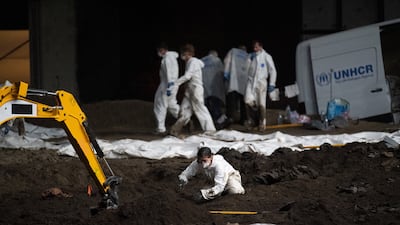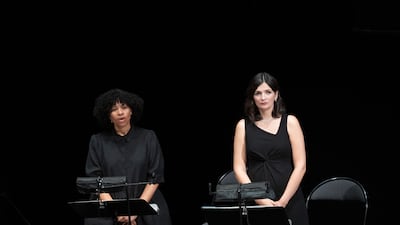Amid the rugged gravel road and red bauxite, new life springs for a festival and an international arts industry battered by the pandemic.
We are in the Stadium de Vitrolles, in the Southern French region of Provence, a near-derelict venue repurposed for a grand performance as part of the annual fine arts gathering, Festival d'Aix-en-Provence.
The festival launched its near-month-long programme of performances with an ambitious and controversial staging of Gustav Mahler’s potent symphony Resurrection, also known as his Symphony Number 2.
First performed in 1895, the piece remains one of the Austro-Bohemian composer’s most popular because of the existential issues presented in it.
At the time of the debut performance in Berlin, Mahler was two years away from converting to Catholicism.
The symphony is looked upon as establishing his view of resurrection and that death is merely a segue to the eternal beauty of the afterlife.

The context of staging Mahler in Festival d'Aix-en-Provence is unambiguous.
With the event a co-production by the Abu Dhabi Festival and directed by Italian playwright Romeo Castellucci, it is presenting a message of global revival following years of cancelled and postponed performances and shows, owing to the Covid-19 pandemic.
"It does speak to the Zeitgeist and what we as humanity have been experiencing," says South African soprano Golda Schultz, who appears in the fifth and final choral movement, in which Mahler summarises that death is only the beginning of eternal existence.
“The pandemic not only shut down theatres and cities, it also robbed us of meeting family, friends and going to funerals. It robbed us of the ways we process loss and death.
“What makes Mahler's work so poignant is that, especially in the final movement, it takes all your grief and lifts it. You leave feeling lighter and the work allows you to lay your burden down."
Not for the faint of heart

For all its soothing properties, the new version featuring the Philharmonie de Paris is a pensive experience.
Castellucci pairs the 80-minute musical composition with unflinching and macabre action on the dirt-filled stage.
It begins with a dazzling white horse trotting on the barren land. Sensing the land is uneven, the trainer kicks away some of the dirt to find a body, uncovering the first in a mass grave.
The action almost functions like a real-life arts installation.
Over the course of the work, staff from the UNHCR arrive with two buses, body bags and an excavator as they unearth the bodies of more than 100 men, women and infants.
The detail, from officials planting little red flags to mark the locations of bodies to filling in the toe tags, is unsparing.

The grim work is done with silence and reverence and raises the question, particularly to those frustrated by the repetitive nature of the action, whether we have all become immune to news of death and war.
The choreography of death was too much for some audience members, Schultz recalls, with a few polite boos heard during Castillo’s bow during a 10-minute standing ovation at the end of the opening night on Monday.
"Maybe some people do and don’t want to do the emotional and existential work that comes with life," she says
"I think whether or not you love what you see on stage, there is no chance this piece will not move you as an audience member.
“Whether you like it or not should never be part of the process of creating art. Art's purpose is to move the needle of your emotional landscape in whatever way.”
The value of arts festivals
Those artistic leaps are also what differentiates programming premiere festivals from regular performance seasons, says Festival d'Aix-en-Provence artistic director, the Lebanese-French Pierre Audi.
“The purpose of a festival is to discover new things,” he says.
“It does give you scope to be more ambitious and this was definitely on my mind when the festival came back last year. We wanted to make an immediate impact, that’s for sure.”
While staging Resurrection can be interpreted as being informed by the pandemic, Audi reveals the concept dates back to 2019.
“I have to say that it was the Abu Dhabi Festival, particularly artistic director Huda Alkhamis-Kanoo, that pushed for this piece,” he says.
“Both festivals worked together in the past and we share a stimulating rapport with their team and as soon as we presented the concept for Resurrection, the festival said ‘yes, we want to be part of this.’”
These sorts of cross-cultural partnerships matter, Audi says, in order to create an exchange at odds with some of the rancour inherent in the world today.
"We do say this a lot but art is a universal language that we can all understand," he says.
"With so many political problems and heated discussions surrounding big issues, like climate change, for example, culture can make some of the changes that we as a society need."
Abu Dhabi Festival builds an international legacy
The Abu Dhabi Festival has been contributing to that dialogue during its 22-year existence.
Resurrection comes on the back of De Scheherazade a Yo, Carmen, another successful co-production starring Spanish flamenco dancer Maria Pages.
After a critically acclaimed opening run of performances in Barcelona in May, the show is set to embark on a two-year world tour taking in Europe and South America.
“Resurrection perfectly embodies the progressive nature of our festival” Kanoosays.
“The enigmatic new production by Castellucci addresses the notion of a 'rebirth' in the aftermath of a pandemic that left the world locked down and socially isolated.”
Kanoo says the international collaboration reflects some of the Abu Dhabi Festival’s aims of creating work pertinent to today's world, while contributing to the industry’ steady recovery in the wake of the pandemic.
“In many ways, by co-producing operatic and classical music works, we are reviving an industry that is experiencing a steady shift in interest due to the evolving artistic tastes of a younger generation,” she says.
“With our co-production of Resurrection, we are showing the world that opera is very much still alive and relevant to today’s modern world.”

This is an aspect Shultz is particularly passionate about.
She maintains the historical art form can still be appreciated today.
“This is what co-productions and art generally does. What we are talking about is human connection," she says.
"Beethoven didn't write music to hear beautiful harmonies, of course, he had no clue because he was deaf. He wrote music because it physically moved him and that's really what we want to do at the most basic level.”
How to listen to 'Resurrection'
The emotive and musically dense nature of the composition requires beginners to approach Resurrection in a specific way, Schultz says.
"Don’t look for a specific instrument you want to follow, just go with whatever is loudest and see how you react," she advises.
"Follow that melodic line of the story that's being told through various instruments and you will feel something."
Schultz recommends listening to any performance of Resurrection by late Italian conductor Claudio Abbado and the Mahler Chamber Orchestra.
"He has this beautiful thing that he does where at the end of the beautiful performance, he would hold his baton at the end of the last note for another 20 seconds to maintain the silence," she says.
"He does it in order for you to have all the feelings conjured by the performance dissipate over you. You walk away after listening to it feeling light and brand new."
Resurrection will be performed at Stadium de Vitrolles in Provence, France on July 10, 11 and 13. More information is available on www.festival-aix.com
Scroll through the gallery below for images from 'De Scheherazade a Yo, Carmen'





















